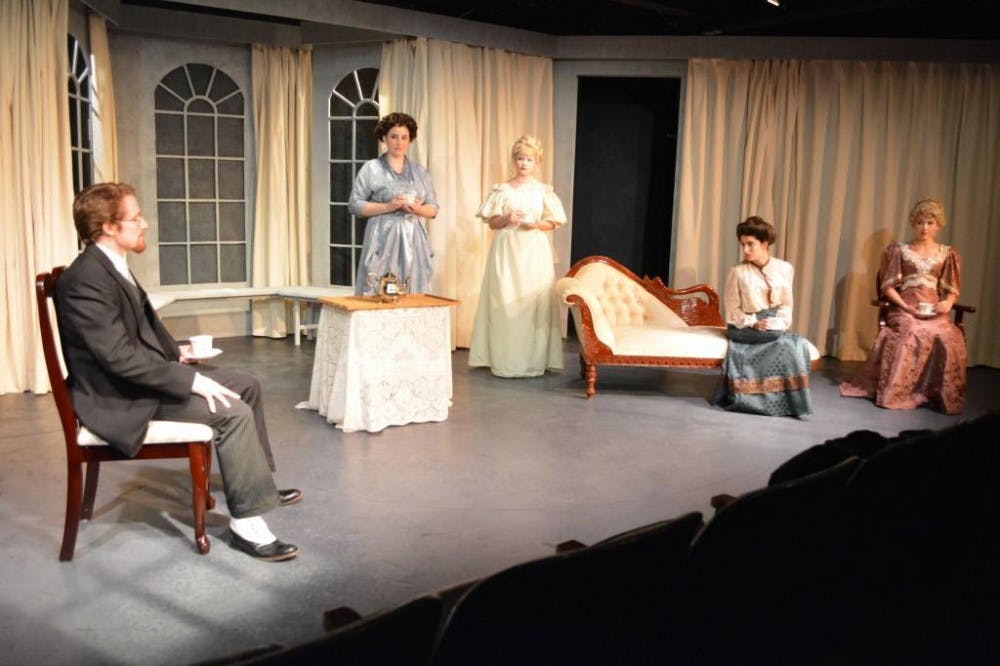Directed by Scot J. Mann, the Mercer Players opened the comical and charming play, “Love Kills,” by Vladimir Volkoff in the Back Door Theatre. The play is a part of “Exile Is My Country,” the International Colloquium held at Mercer on the writings of Volkoff, a celebrated and provocative Russian and French writer. This was organized with the help of Dr. John Marson Dunaway, Professor of French and Interdisciplinary Studies at Mercer. The production was an exciting way to celebrate the works of the late Volkoff. The plot of “Love Kills” is very complex, yet compelling. In this play, Volkoff presents a man, Landru, who has had four wives: Evelyne, Artemise, Valerie, and Junie. He murdered all of them. As he proceeds to say later in the play, he did not kill them; “they killed themselves.” He later tells his wives in purgatory that he killed them all because “love kills.” He killed them to preserve what he perceived to be the essentially best part of them.
In the Mercer Players’ cast did an excellent job in the presentation of “Love Kills.” Hannah Fancher (Evelyne), Hannah Hyde (Artemise), Leah Parris (Valerie) and Julie Allen (Junie) portrayed the four Madames Landrus very artfully. Their character mannerisms were convincing and consistent throughout the entire performance. Evelyne constantly touched her head as Artemise strangely gaped her mouth. Valerie repeatedly stretched and held her sore hand while Junie sniffed the air. Each of these acts symbolized the manners in which Landru killed them: a shot to the head, a drink of poisoned absinthe, the opening of a bomb, and exposure to a gas leak.
Just as they died in different ways, each one had a distinctly different personality. Fancher portrayed the ditzy, naive homemaker wife who could not stop going on and on about and scrambling to do chores. She was comically optimistic and annoyingly organized. She was beautiful, but in the eyes of Landru, she corrupted her beauty with her talk of household chores. Hyde vividly depicted the strongly opinionated intellectual woman. She presented friendship to Landru. But she “would not allow anything,” she would always complain and she was a slob. She was too busy with her astronomer work to be a wife to Landru and constantly drank absinthe. Her snippy attitude was absolutely toxic. Parris innocently presented herself as Landru’s young, incredibly beautiful niece. The audience observed the shift in her character as she later became selfish, destroying her beauty with her scandalous actions. Allen represented the closest ideal wife for Landru. She exemplified the personality of the most worrisome woman who had the highest hopes for her husband. Her worrisomeness also came from her clever intuition that Landru has murdered his other wives. She quickly ran around to try to do whatever it would take to make him happy and constantly asked if he was happy.
Dr. Landru, a psychiatrist, played by Liam McDermott, was absolutely clever, humorous and captivating. His cause for killing his wives was merely innocent in his eyes. McDermott was ever the idealist as Landru. He loved them all, but they were not true to themselves. Landru claimed “love has meaning only in relation to its object.” He saw their beauty and they corrupted it, so he had no other choice but to kill them. Whether that seems delusional or plain crazy, Landru remained loyal to his reasoning. McDermott’s clever banter with the grey angels-- all named Dugazon-- played by Cohen Bickley, Patrick Mathis and Braeden Orr, only emphasized how methodical the good little doctor was. He ends up in purgatory after being guillotined for killing his last wife. But in the end, he meets his true match: the beautiful, controversial and eerie Lucretia Borgia, played by Ninti Chance. With her cold stare and ruthlessness, she literally brings Landru to his knees and by her side for the rest of eternity. He might have thought that his fate with any of his other wives would be dreadful, but the play ends with a seemingly worse outcome.
The three Dugazons performed the set changes and interacted in varying ways with their fellow cast members. The set changes were funny and they occasionally included audience interaction. They all played their parts wonderfully and added more comedy to the story line. The set changes were minimal, but just enough to carry the varying ideas for the rooms that the characters acted in.
The Mercer Players’ production of “Love Kills” is a must see. It is a play that keeps the audience wanting more and the actors and actresses played their parts wonderfully. Their costumes were very charming and well-made for the early 1900’s scenes that were portrayed. With a play as complex as this, the cast definitely carries out the murderous and love-motivated plot of Landru and his four wives. “Love Kills” will be performed from Nov. 14-16 and 20-22 at 7 p.m. and on November 17, 23, and 24 at 2 p.m. Tickets are $5 and the box office opens 30 minutes before curtain.





